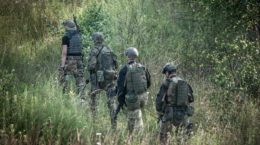The fact that a significant number of the PMC “Wagner” mercenaries (over 3000 people according to different estimates) moved to Belarus, undoubtedly has become a huge destabilizing issue both for the Republic of Belarus and for the Eastern European region in general. However, all the parties of the current conflict are trying to use this situation for their benefit, thus, a lot of wrong speculations arise. Therefore, we have made an attempt to get to the bottom of how the things really are and what threats the Wagner mercenaries pose to Belarus and its neighbors.
A mythical threat: the PMC “Wagner” mercenaries will attack Lithuania or Poland
It was the first and very natural reaction among the democratic neighbors of Belarus. Also, the Russians fueled those fears very skillfully. For example, on June 16, the head of the Russian State Duma’s Defence Committee, Andrey Kartapolov, said on Russian television, that the PMC “Wagner” was deployed in Belarus to create a “shock fist” near the Suwałki corridor on the border of Poland and Lithuania. “We are talking about a shock fist which will take that poor corridor within a few hours”, the Russian deputy said.
It’s clear, why such statements scare western politicians, and first of all, the leadership of Lithuania, which then begins to see Wagnerians and all the Belarusians as one whole, as the same threat. Of course, it is both wrong and terribly unfare.
Yet, why is this threat mythical? First of all, because the Wagnerians are paid mercenaries, and they value their lives too much to engage in a real war with the NATO forces. It is the trained skeleton staff of the Wagner Group which is moving to Belarus, that is, the mercenaries who fought in the countries of Africa and Syria. Of course, they fought in Ukraine as well, yet it would be more correct to say, that they hauled away the crowds of convicts taken from prisons to play the part of cannon fodder in the so-called “meat attacks”. They did not really jump into Ukrainian trenches themselves holding machine guns in their hands. If they had done that, they would have never arrived to Belarus.
That is, the current contingent of the PMC “Wagner” in Belarus contains people who do not wish to attack Vilnius or the Suwałki corridor, but prefer to go back to Africa as soon as possible and make a lot of money there as punitive detachments of regional power brokers. Actually, this is what Yevgeny Prigozhin promised them.
A mythical threat: The PMC “Wagner” mercenaries will attack Ukraine from Belarus, striking Kyiv from the north
The price the Ukrainians are paying for the lesson of February 24, 2022, is too high to be ignored. Only those who have not seen what the Ukrainians turned their territories boarding with Belarus into, can be afraid of the Wagnerians’s attack on Kyiv from the north. We have. It is a solid strip of fortifications and minefields, scanned and exposed to fire through and through. It is probably the most well-fortified territory in the world, defended by highly motivated soldiers. Those soldiers who fight to protect their homes and their families, not to earn money.
Real problem: the Wagner Group as a “garrote” for the Belarusian regime
Aliaksandr Lukashenka can boast as much as he can in front of the TV cameras, that he intervened and made peace between the Kremlin and the PMC “Wagner”, and then invited Prigozhin and his people to Belarus. In reality, it’s not a secret to anyone, that he was just made to face the fact that the Wagner Group was going to be deployed in Belarus from that time forward and allowed to present himself as a peacemaker in compensation (Mr. Lukashenka loves such things too much).
To tell you the truth, we would give up a lot to see the expression on Lukashenka’s face at the moment when the Kremlin called and told him: now, the Wagner Group is going to be based in Belarus. Indeed, Wagnerians in Belarus constitute sort of a “Praetorian Guard” of the Kremlin – bloody rascals with no official links to the Russian leadership, and ready to crash all Lukashenka’s attempts to act independently and not in compliance with the Moscow policy, if needed.
One even does not have to say that the Belarusian military and special services are obviously scared of Wagnerians even more, than they are scared of the Kastuś Kalinoŭski Regiment. It is because the PMC “Wagner” mercenaries are people completely strange to Belarus, very cruel (it is a factor of their internal selection) and with a huge combat experience. It is highly unlikely, that the Belarusian military who have never smelled the gunpowder in their lives, will risk to oppose that hoard of mercenaries in case a conflict arises.
Real problem: the Wagner Group as a safety-lock from democratic changes in Belarus
This problem arises from the previous one. The Wagner Group in Belarus is not only a “garrote” on Lukashenka’s neck, it is also a good safety-lock from potentially probable repetition of the Belarusian Revolution. They are a hit squad that, if needed, will not shy away from shooting both the peaceful citizens and the Belarusian enforcers if they dare to side with the people.
Actually, they have been successfully performing that function in over a dozen of African countries, where the local autocrats hired the PMC “Wagner” to defend themselves and their power from the opposition. The opposition which is traditionally both much more determined and much better armed than the Belarusian democratic forces.
Real problem: Wagnerians as new fashion in Belarus
It seems that a new youth fashion has been born, which is fascination with the PMC “Wagner” mercenaries, their romanticization and glorification. The reason is that in the recent months the Wagnerians have been constantly and loudly present in the media space, and that the significant part of the PMC “Wagner” is being now redeployed in Belarus. The most astonishing part is that the Wagnerians are becoming an attractive alternative for that part of the youth who are not enthusiastic about the regular military service in the Armed Forces of the Republic of Belarus.
Now, the Wagner Group even have their own particular fan circle in Belarus. It consists of young people with excessive testosterone in their blood and an acute deficit of knowledge, life experience and critical thinking. For them, war is romanticism, and not blood, guts outside a body and arms and legs blown away. They are attracted by the romanticism of mercenaryism, of men’s combat “brotherhood”, independent from dull bureaucrats. No wonder, that on the 5th of July, a Telegram channel “Wagner Belarus” appeared, which has already gained 2000 subscribers. That Telegram channel is the one that is uniting the youth attracted by the romanticism of “the soldiers of fortune”.
The mental space in Belarus is tightened into normative and ideological frames to the limit. It seems like unanimity is triumphing in the country. Nevertheless, there is the other side of such lack of freedom, of such pressure exhorted by those in power on the society: most unexpected fashions, sects, ideologies and movements unexpectedly burst forth and flourish. In addition, they are almost always of extremist character, as the self-regulating mechanisms of the civil society are suppressed by an authoritarian regime.
The youth in Belarus is being attacked from several sides: by the regime’s official enforcers through “patriotic camps” and other militarist projects under the sauce of “patriotism”, and now also by mercenaries, recognized as an international criminal organization, the Wagner Group, a.k.a., the Private Military Company (PMC) “Wagner”.
Real problem: the Wagner Group can seize power in Belarus
How many people remember how the war of the USSR in Afghanistan began? There was such an episode, the storm of Amin’s palace. In December 1979, a group of the Soviet special forces seized the palace of Hafizullah Amin, then Chairman of the Afghan Revolutionary Council, overthrew and killed him, and brought another Afghan leader, Babrak Karmal, to power. Several hundreds of well-prepared Soviet fighters dealt with several thousands of Afghan soldiers armed with tanks and other heavy weaponry and having strong defensive positions without too much effort.
The irony is, it had been Hafizullah Amin to invite the Soviet military to Afghanistan so that they would defend it against “external enemies” and “train the Afghan army”. The parallels with the arrival of the Wagner Group in Belarus suggest themselves.
History knows a lot of examples (from medieval Italy to Africa of the second half of the XXth century), when condottieri (mercenary commanders) betrayed their employers and conquered whole cities and countries, becoming, thus, themselves rulers. Now, a similar situation is brewing in Belarus in front of our eyes. If the ambitions of Prigozhin and Utkin drove them to mutiny against Vladimir Putin, it is quite likely they can become willing to lay hands on a middle-sized European country that no NATO is going to stand up for.
Of course, in case of an armed clash between the Wagner Group and the Security Service of Lukashenka, we wish victory to the both sides. However, whatever the result, it is going to be bad for the Belarusian nation in either case. To live under the power of thugs-mercenaries that took over the country, or under the power of a usurper that has lost his brakes – choose between the two catastrophes…
Our House










